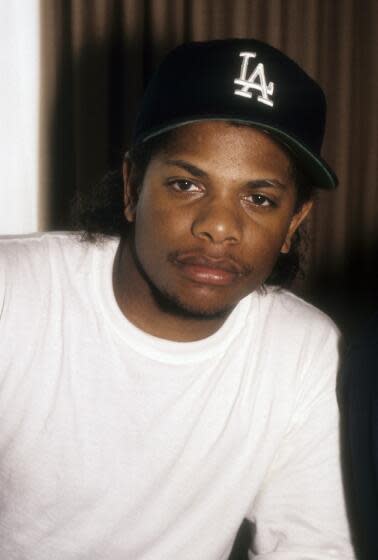Eazy-E is getting a Compton street named after him: Rapper 'loved where he was from'
- Oops!Something went wrong.Please try again later.
- Oops!Something went wrong.Please try again later.
- Oops!Something went wrong.Please try again later.
- Oops!Something went wrong.Please try again later.
- Oops!Something went wrong.Please try again later.

Soon, you can be cruising down Eazy Street in your '64.
Next week, Compton will unveil the newly renamed road dedicated to the late rap icon Eazy-E, who was born and raised in the city. The rapper, alongside fellow N.W.A. members Dr. Dre, Ice Cube, DJ Yella, MC Ren and Arabian Prince, popularized Compton through their era-defining West Coast rap albums. Eazy-E, whose real name is Eric Lynn Wright, died in March 1995 at age 30, days after he announced he had been diagnosed with AIDS.
In September, the Compton City Council unanimously voted to rename the 100 block of Auto Drive South, which runs off of Alameda Street and into the Gateway Towne Center shopping plaza, as "Eazy Street." A block party will be held at the street on Nov. 22 to celebrate the moment with performances and appearances from the "Boyz-n-the-Hood" rapper's children and his former collaborators.
Read more: The 50 greatest moments in hip-hop history
“My dad loved where he was from," said Erica Wright, the rapper's daughter, in a statement. "Nothing could keep him from Compton. Nothing could keep his parents from Compton. This will forever be a highlight in my life."
Eazy-E's son Eric Darnell Wright Jr., who rapped under the name Lil Eazy-E, added, "The street naming serves as a symbol of recognition and commemoration, ensuring that our father ... has a legacy that will be remembered and celebrated for generations to come."
"It is a wonderful way for the city of Compton to honor his influence and the cultural significance that he brought to the community," said Wright Jr., who will perform next week alongside DJ Yella.
Read more: When L.A. invented rap radio: The rise of KDAY
Compton native Eric Lynn Wright was a high school dropout who dealt drugs for a living before shooting to stardom in 1988 when his rap group, N.W.A., dropped the debut album "Straight Outta Compton" as well as Wright's solo project, "Eazy-Duz-It." Both albums were released under Wright's label, Ruthless Records, which he co-founded with Jerry Heller. The releases would be considered the opening of a new era for hip-hop, a genre and industry that had primarily been defined and commercially dominated until that point by East Coast acts.
With iconic music videos showing Wright and his group parading through the streets of Compton, they placed the Los Angeles County city in America's pop-cultural consciousness.
Alonzo Williams, one of Wright's earliest collaborators, is known as the godfather of West Coast hip-hop and now heads the Compton Entertainment Chamber of Commerce. He spearheaded the naming of Eazy Street. Williams was the owner of Compton's Eve After Dark nightclub, which helped launch acts including Dr. Dre and Eazy-E and was referenced in the 2022 Super Bowl halftime show.
Read more: Q & A with EAZY-E : 'Gangsta Rap? It's Reality Rap'
Wright went to Williams for advice when setting up Ruthless Records and introduced him to Heller, Williams recalled in an interview with The Times' 404 correspondent Greg Ruben. And even after Wright found fame, Williams said, the rapper would often visit him at his garage, where N.W.A. recorded their first songs. The two would pass time cracking jokes.
Wright was active in the community and often paid for and hosted events for residents, Williams said. He hoped having Eazy Street would be an extension of that legacy.
"People come to Compton to see what Compton has to offer," he said, "and there are no tourist attractions in Compton." He also plans to start the city's own walk of fame.
Read more: Granderson: We have the tools to stop the spread of HIV. So why haven't we?
This story originally appeared in Los Angeles Times.
